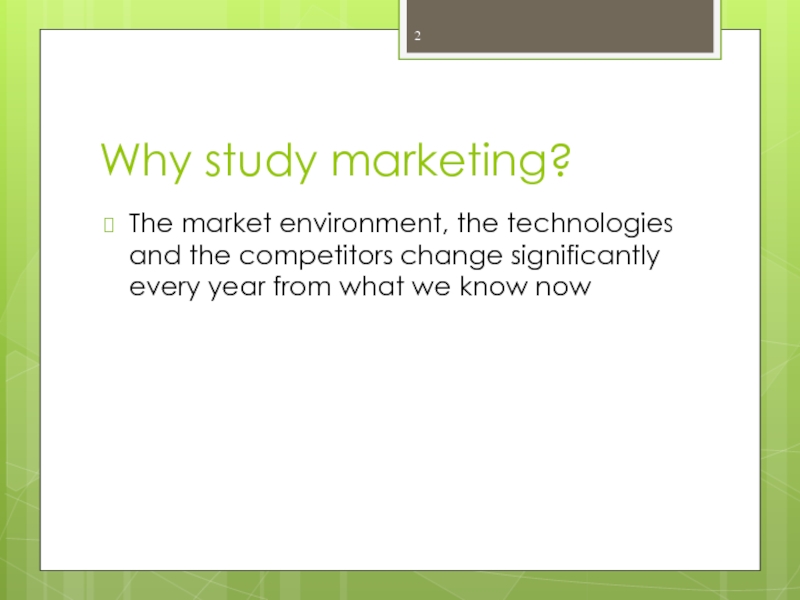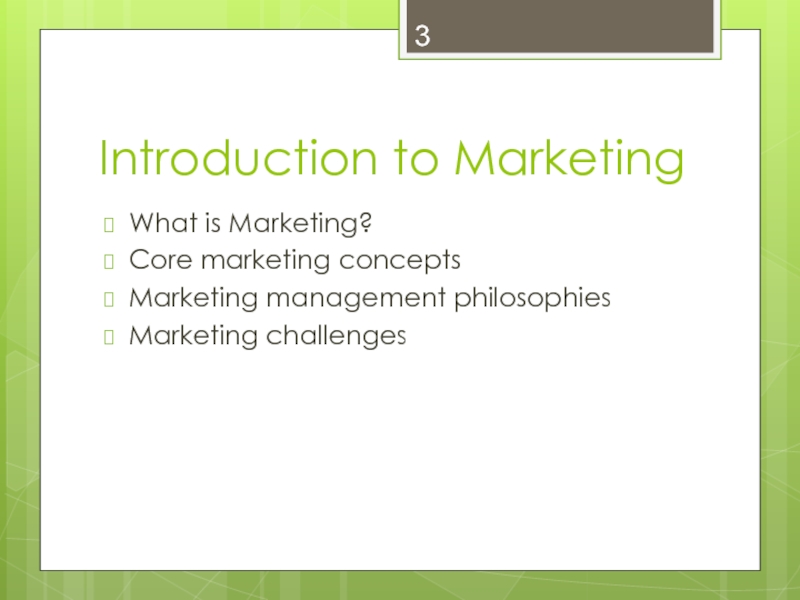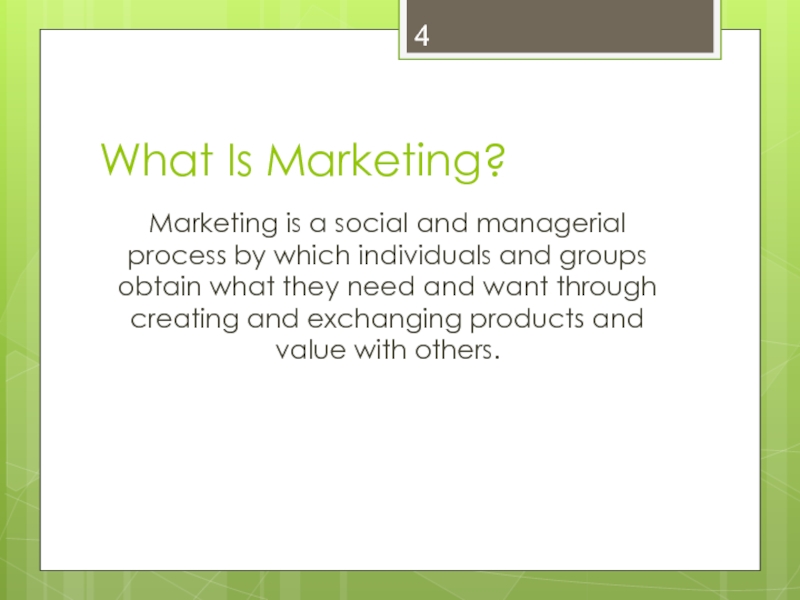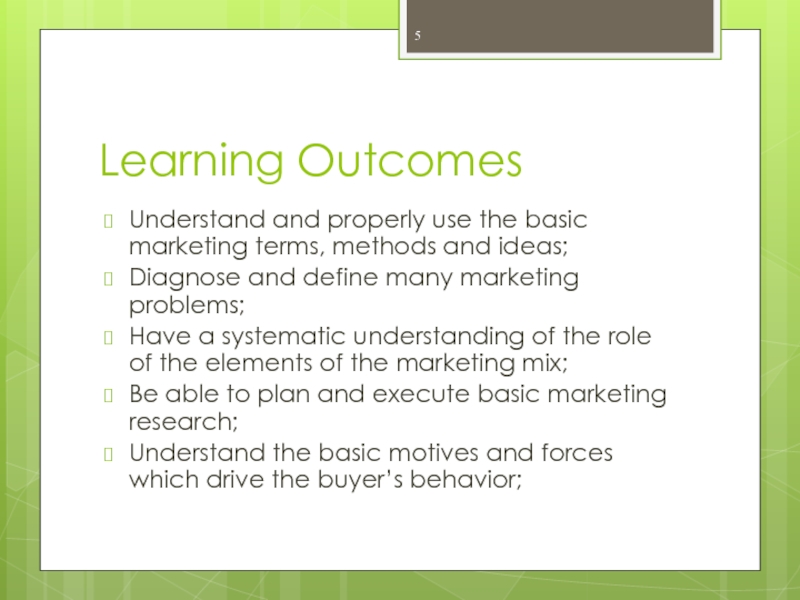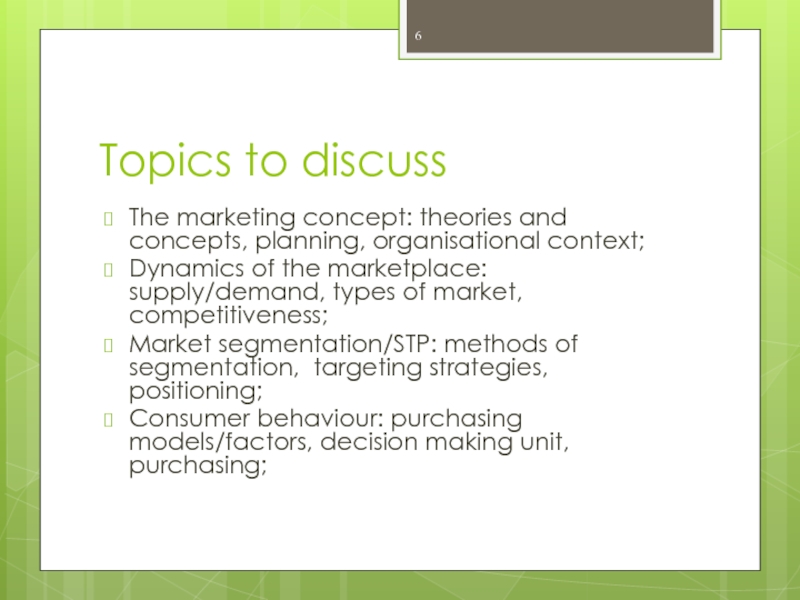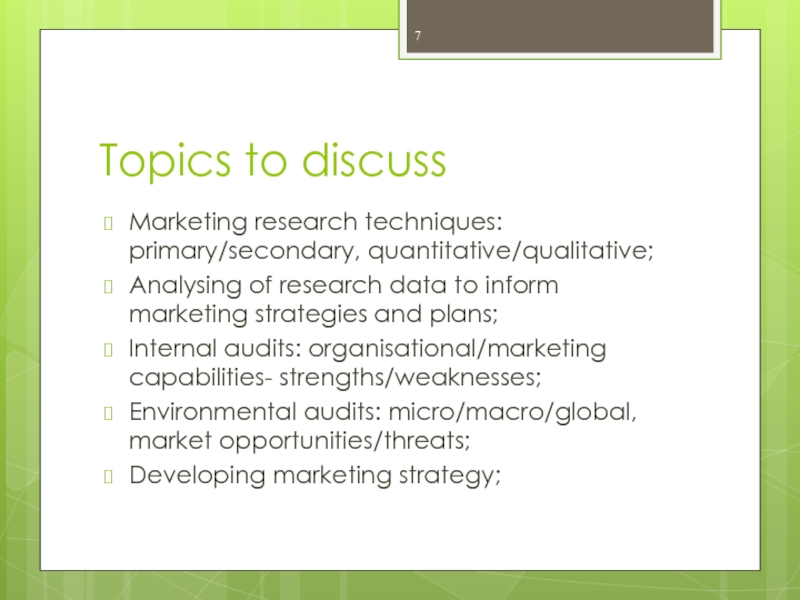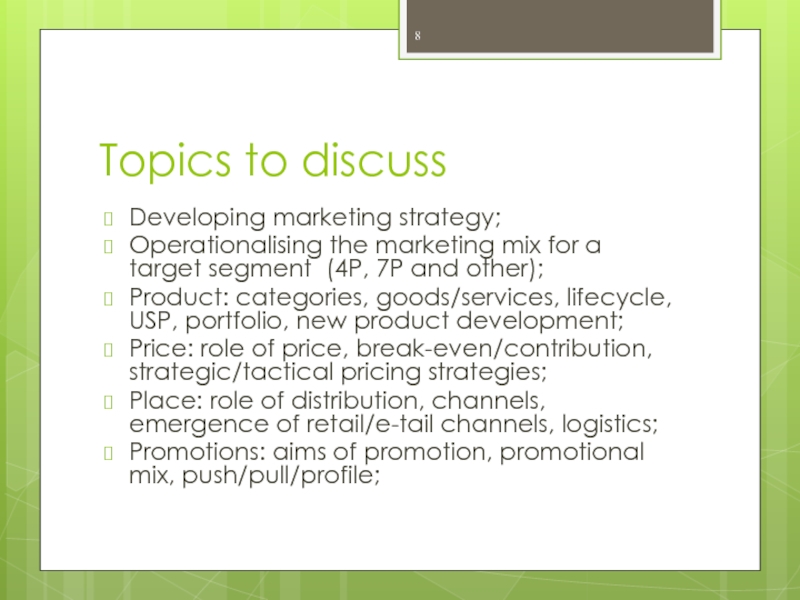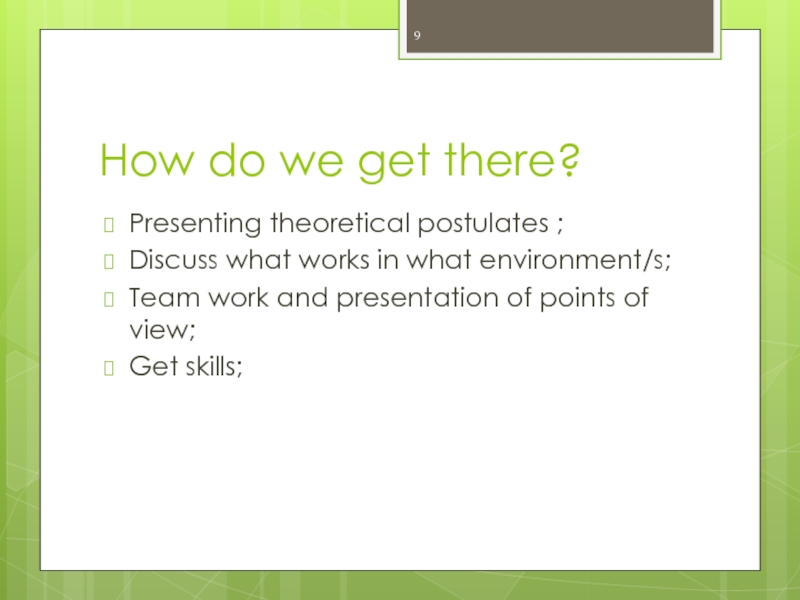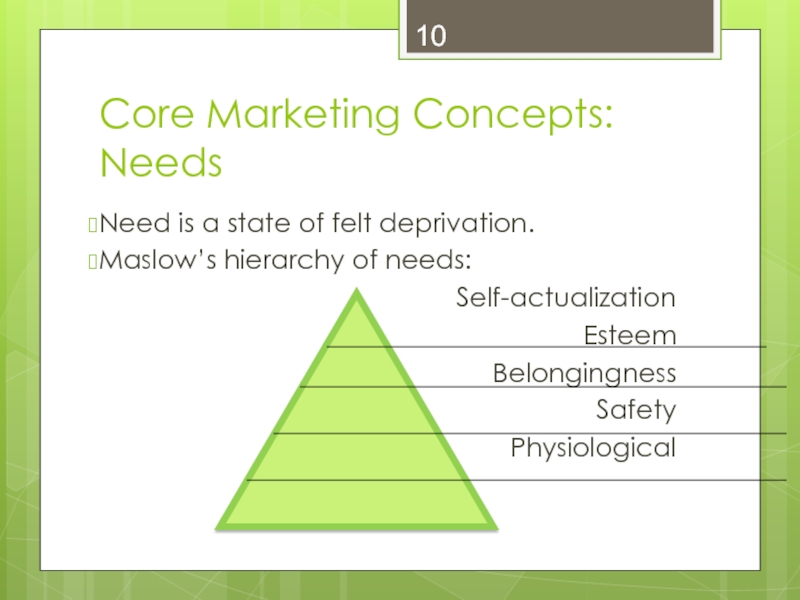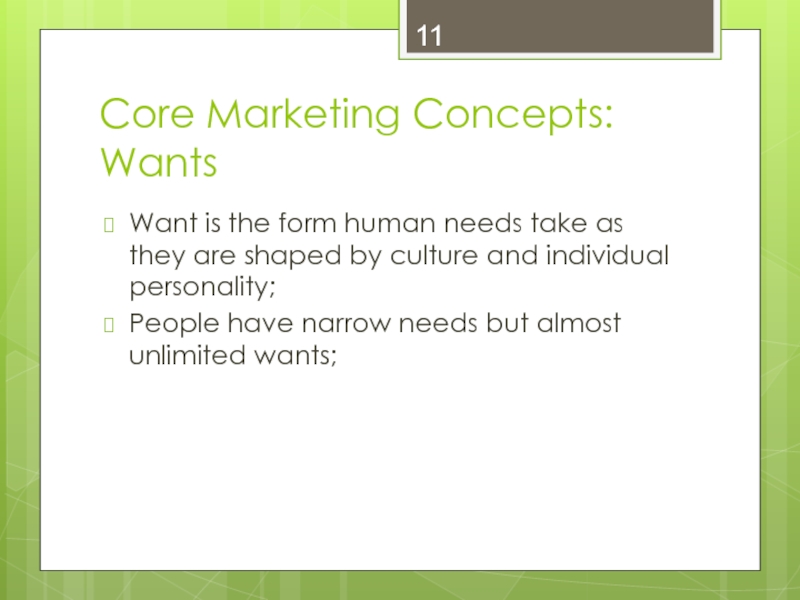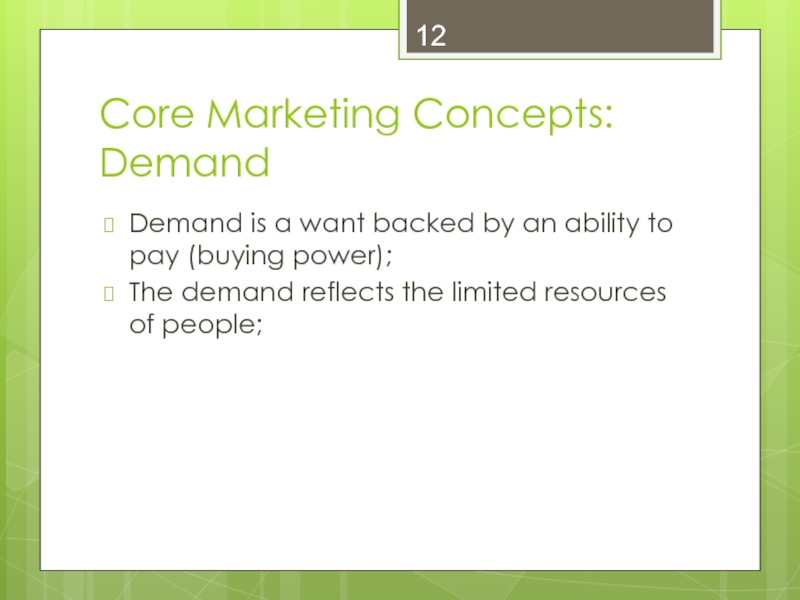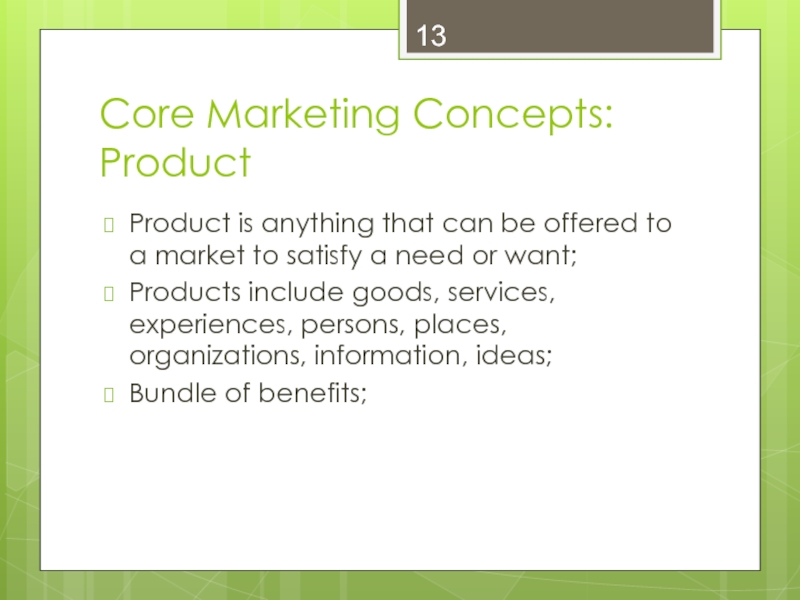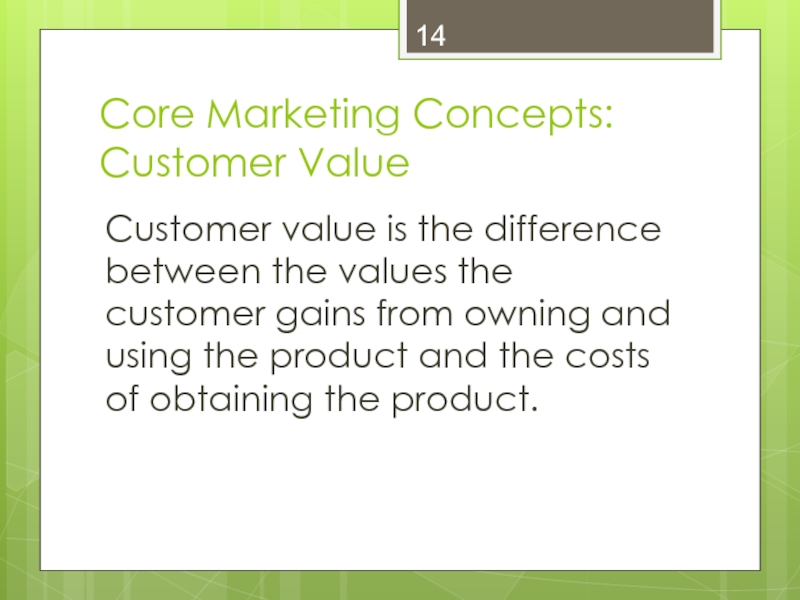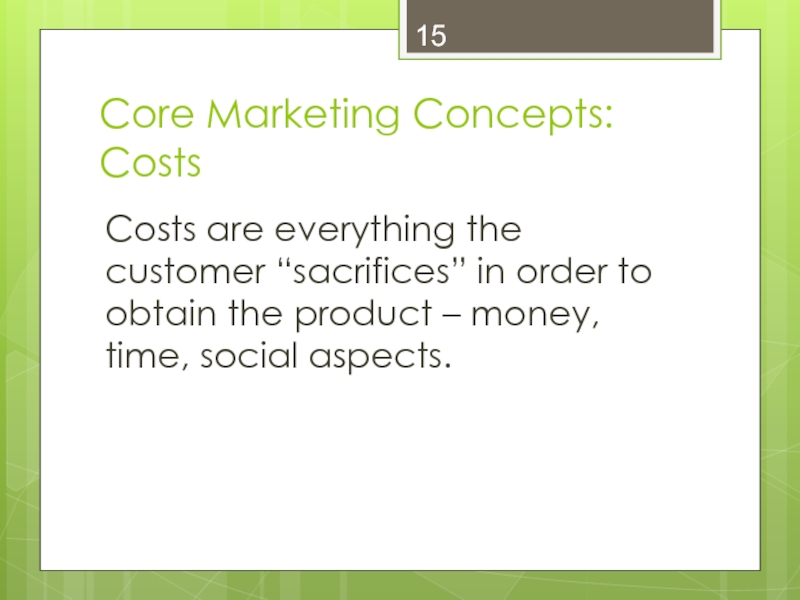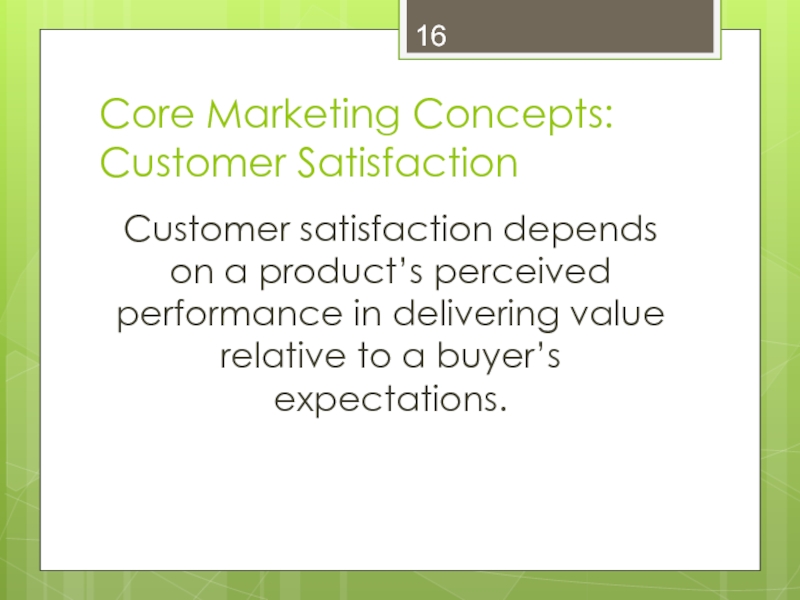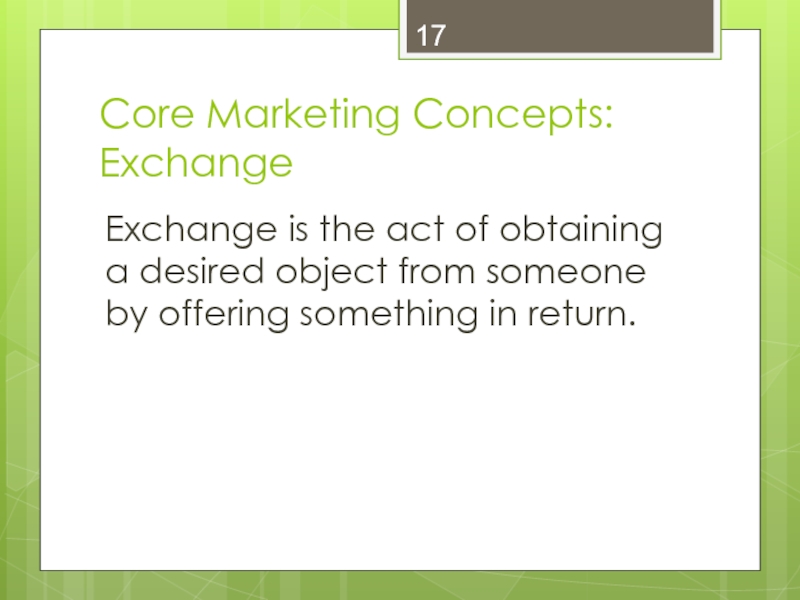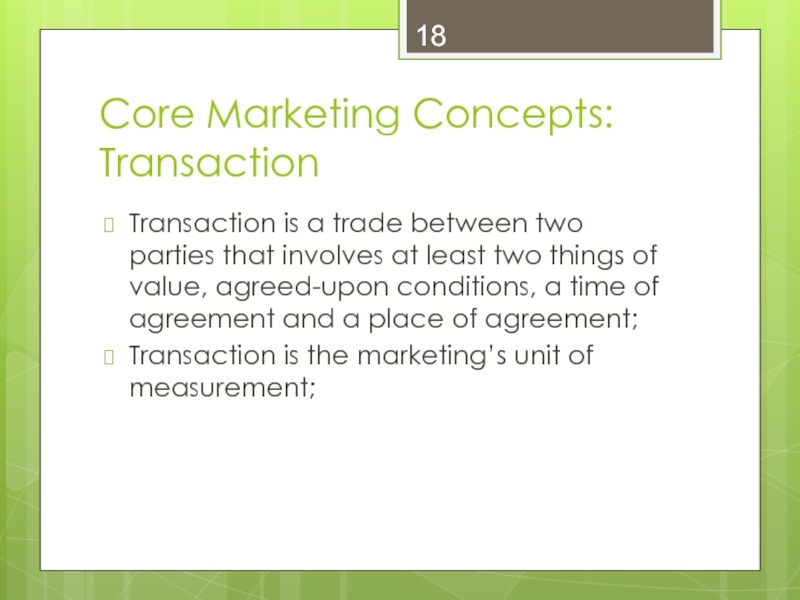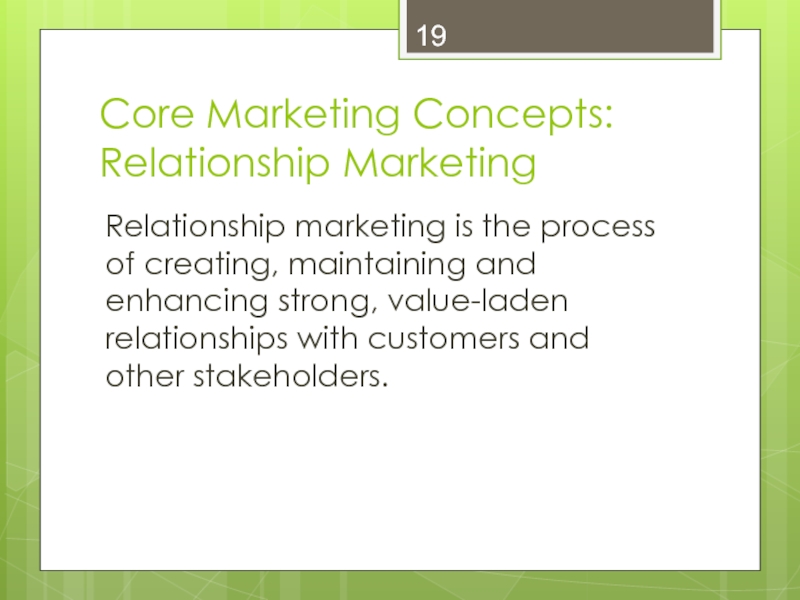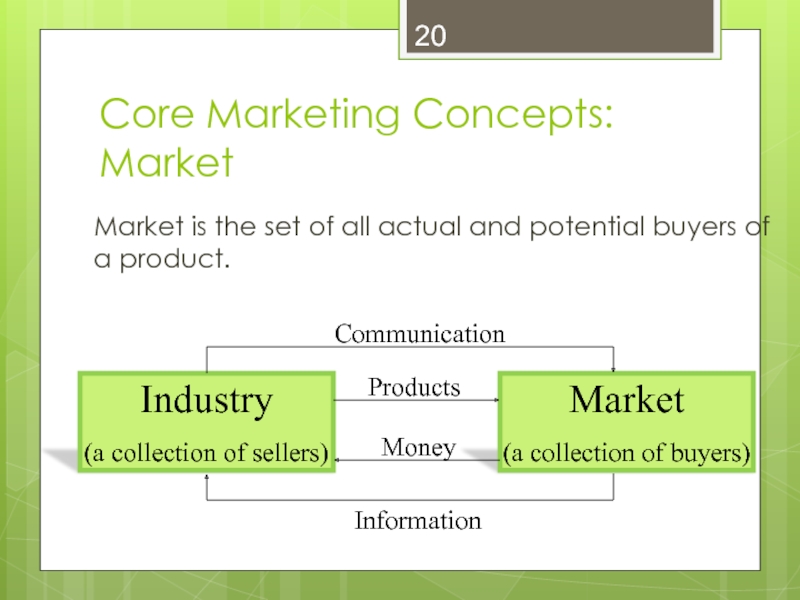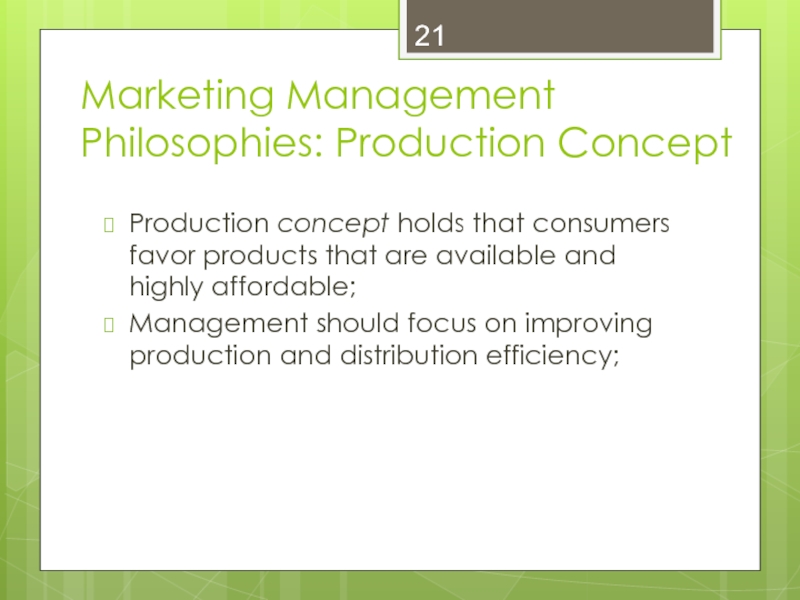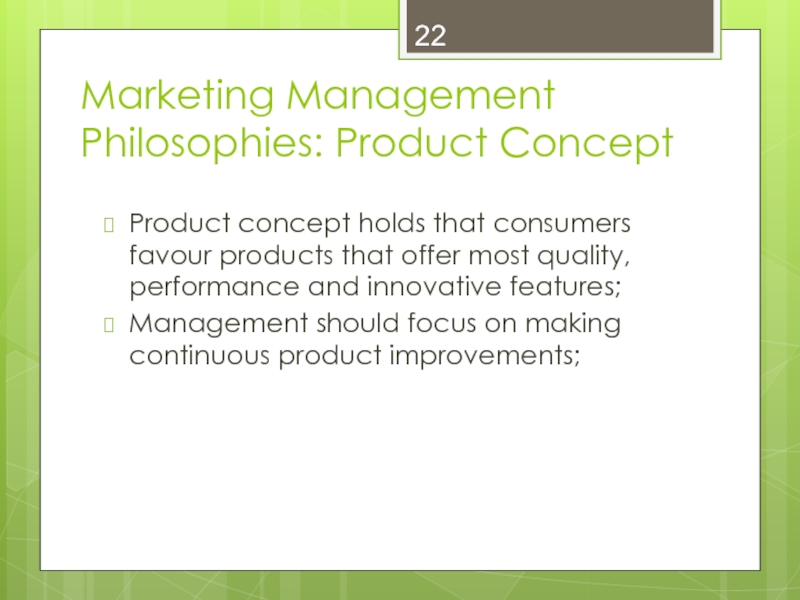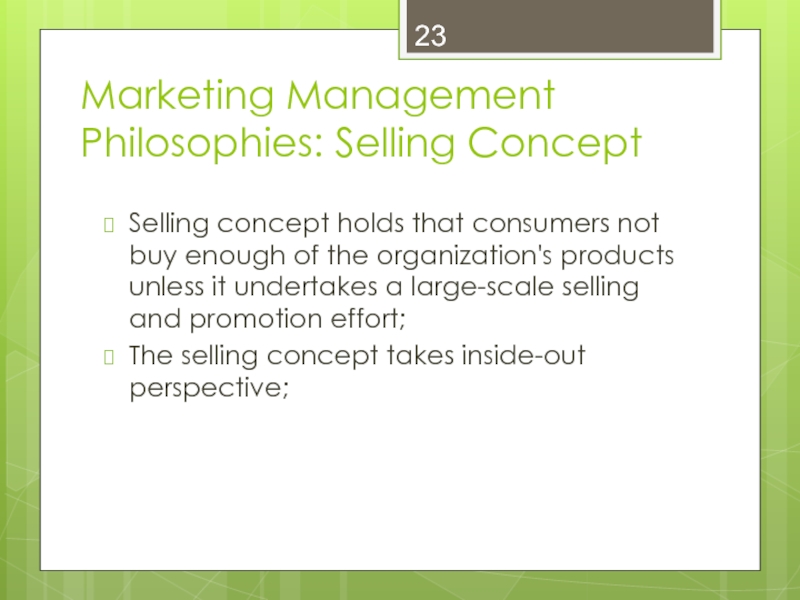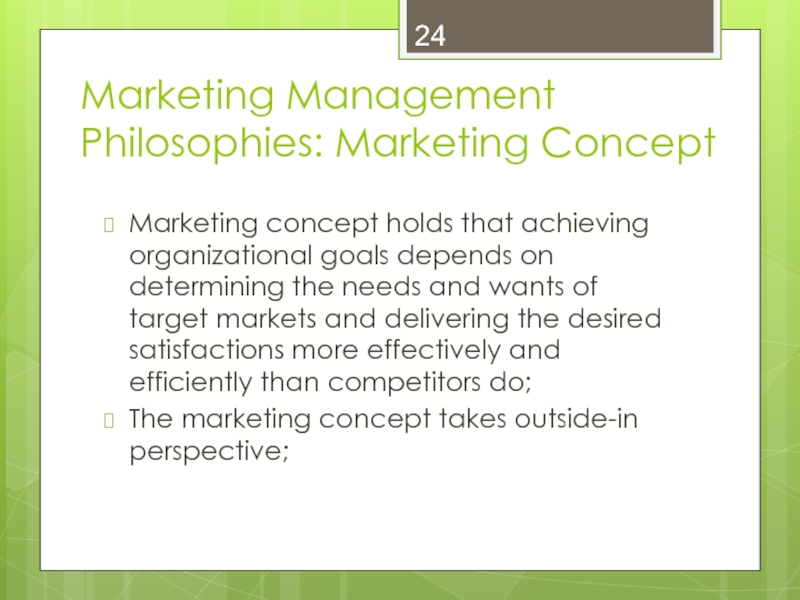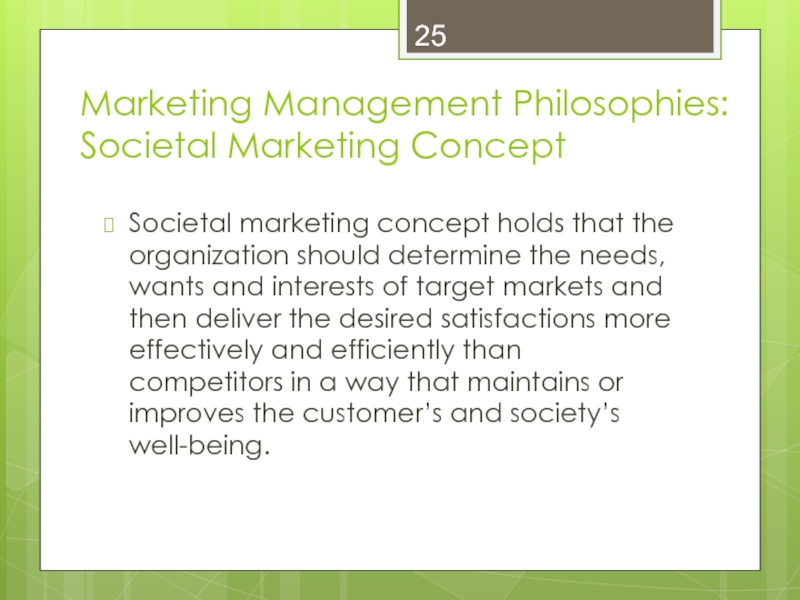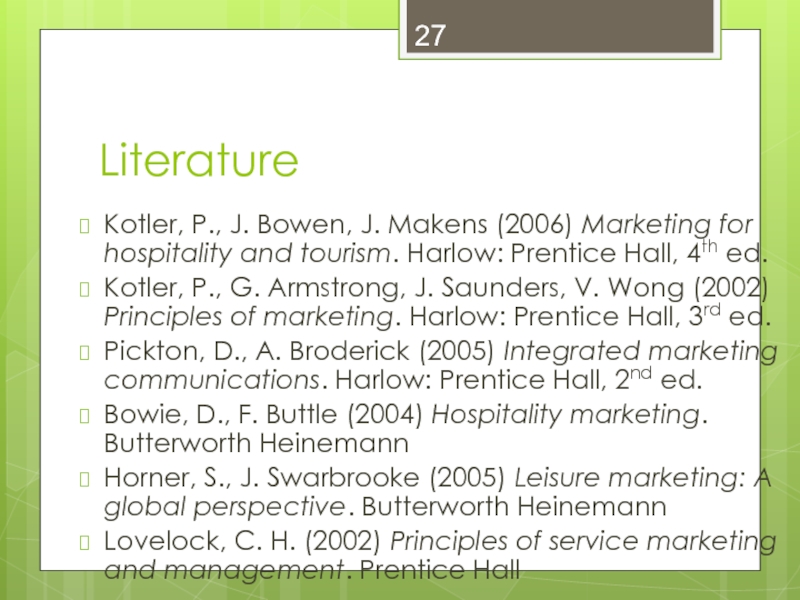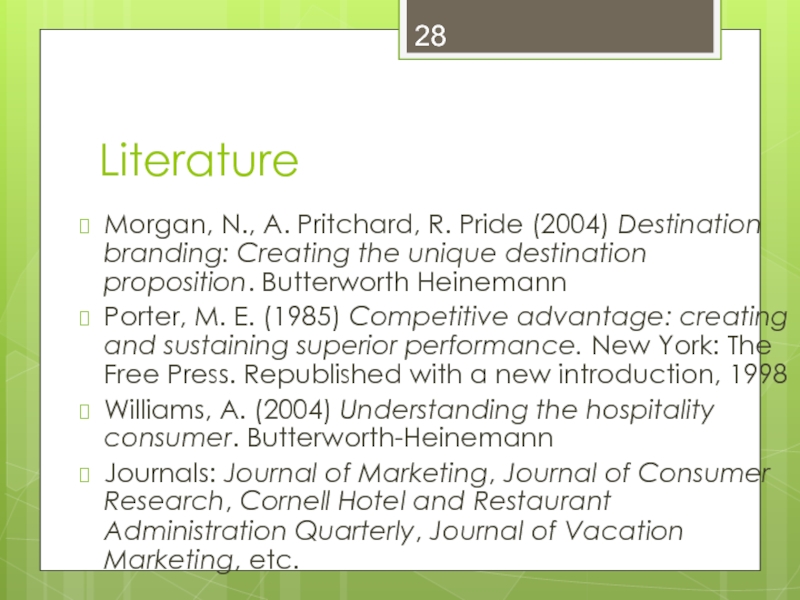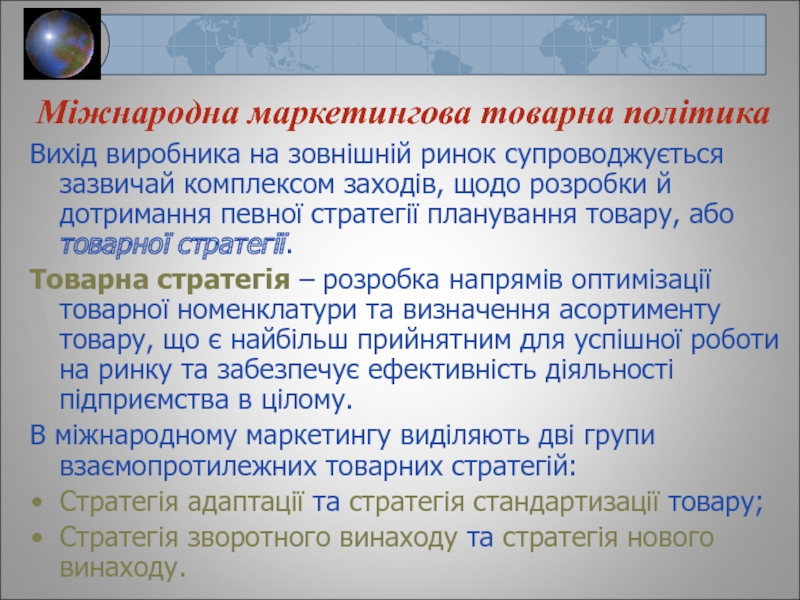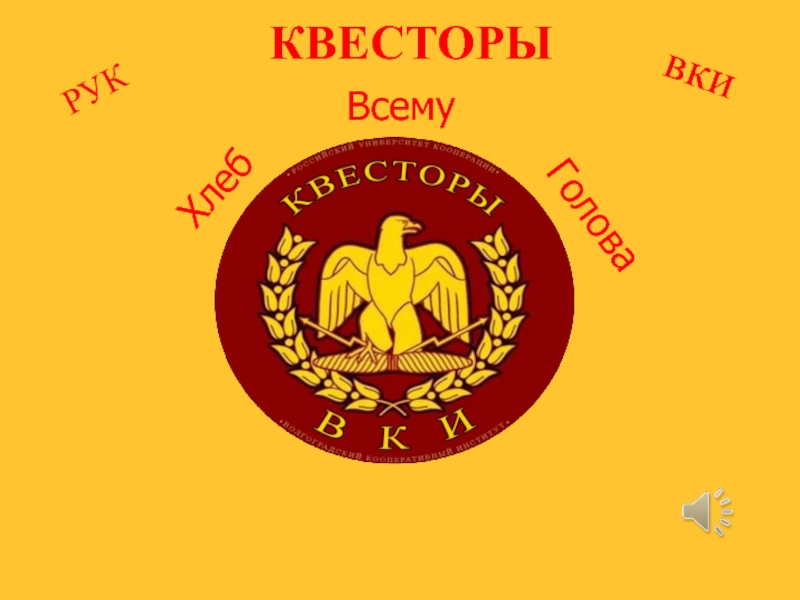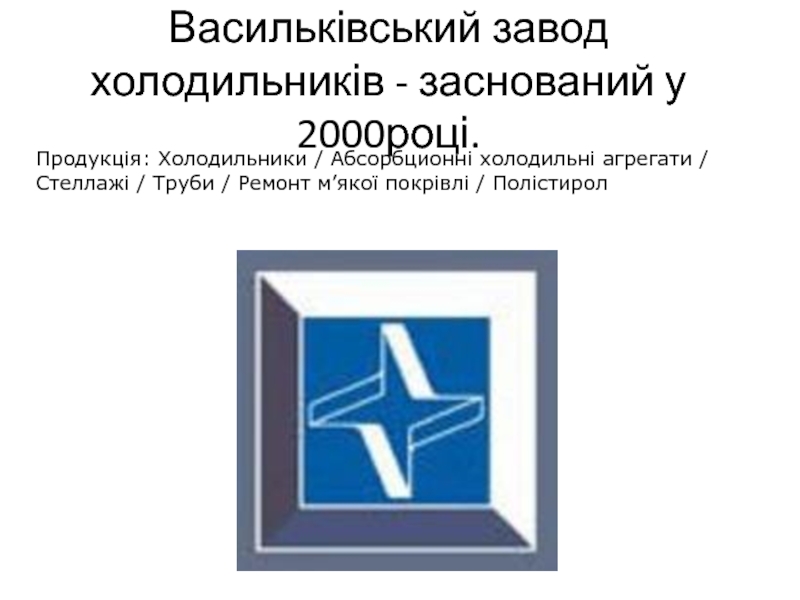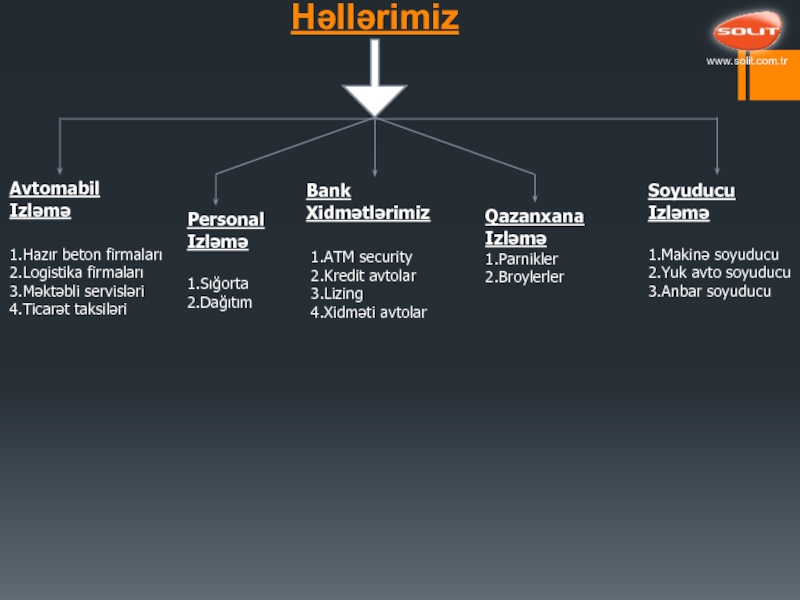- Главная
- Разное
- Дизайн
- Бизнес и предпринимательство
- Аналитика
- Образование
- Развлечения
- Красота и здоровье
- Финансы
- Государство
- Путешествия
- Спорт
- Недвижимость
- Армия
- Графика
- Культурология
- Еда и кулинария
- Лингвистика
- Английский язык
- Астрономия
- Алгебра
- Биология
- География
- Детские презентации
- Информатика
- История
- Литература
- Маркетинг
- Математика
- Медицина
- Менеджмент
- Музыка
- МХК
- Немецкий язык
- ОБЖ
- Обществознание
- Окружающий мир
- Педагогика
- Русский язык
- Технология
- Физика
- Философия
- Химия
- Шаблоны, картинки для презентаций
- Экология
- Экономика
- Юриспруденция
Introduction to Marketing презентация
Содержание
- 1. Introduction to Marketing
- 2. Why study marketing? The market environment, the
- 3. Introduction to Marketing What is Marketing? Core marketing concepts Marketing management philosophies Marketing challenges
- 4. What Is Marketing? Marketing is a social
- 5. Learning Outcomes Understand and properly use the
- 6. Topics to discuss The marketing concept: theories
- 7. Topics to discuss Marketing research techniques: primary/secondary,
- 8. Topics to discuss Developing marketing strategy; Operationalising
- 9. How do we get there? Presenting theoretical
- 10. Core Marketing Concepts: Needs Need is
- 11. Core Marketing Concepts: Wants Want is
- 12. Core Marketing Concepts: Demand Demand is
- 13. Core Marketing Concepts: Product Product is
- 14. Core Marketing Concepts: Customer Value Customer
- 15. Core Marketing Concepts: Costs Costs are
- 16. Core Marketing Concepts: Customer Satisfaction Customer satisfaction
- 17. Core Marketing Concepts: Exchange Exchange is
- 18. Core Marketing Concepts: Transaction Transaction is
- 19. Core Marketing Concepts: Relationship Marketing Relationship
- 20. Core Marketing Concepts: Market Market is
- 21. Marketing Management Philosophies: Production Concept Production concept
- 22. Marketing Management Philosophies: Product Concept Product concept
- 23. Marketing Management Philosophies: Selling Concept Selling concept
- 24. Marketing Management Philosophies: Marketing Concept Marketing concept
- 25. Marketing Management Philosophies: Societal Marketing Concept Societal
- 26. Marketing Challenges: Globalization Connectedness – with customers,
- 27. Literature Kotler, P., J. Bowen, J. Makens
- 28. Literature Morgan, N., A. Pritchard, R. Pride
Слайд 2Why study marketing?
The market environment, the technologies and the competitors change
significantly every year from what we know now
Слайд 3Introduction to Marketing
What is Marketing?
Core marketing concepts
Marketing management philosophies
Marketing challenges
Слайд 4What Is Marketing?
Marketing is a social and managerial process by which
individuals and groups obtain what they need and want through creating and exchanging products and value with others.
Слайд 5Learning Outcomes
Understand and properly use the basic marketing terms, methods and
ideas;
Diagnose and define many marketing problems;
Have a systematic understanding of the role of the elements of the marketing mix;
Be able to plan and execute basic marketing research;
Understand the basic motives and forces which drive the buyer’s behavior;
Diagnose and define many marketing problems;
Have a systematic understanding of the role of the elements of the marketing mix;
Be able to plan and execute basic marketing research;
Understand the basic motives and forces which drive the buyer’s behavior;
Слайд 6Topics to discuss
The marketing concept: theories and concepts, planning, organisational context;
Dynamics
of the marketplace: supply/demand, types of market, competitiveness;
Market segmentation/STP: methods of segmentation, targeting strategies, positioning;
Consumer behaviour: purchasing models/factors, decision making unit, purchasing;
Market segmentation/STP: methods of segmentation, targeting strategies, positioning;
Consumer behaviour: purchasing models/factors, decision making unit, purchasing;
Слайд 7Topics to discuss
Marketing research techniques: primary/secondary, quantitative/qualitative;
Analysing of research data to
inform marketing strategies and plans;
Internal audits: organisational/marketing capabilities- strengths/weaknesses;
Environmental audits: micro/macro/global, market opportunities/threats;
Developing marketing strategy;
Internal audits: organisational/marketing capabilities- strengths/weaknesses;
Environmental audits: micro/macro/global, market opportunities/threats;
Developing marketing strategy;
Слайд 8Topics to discuss
Developing marketing strategy;
Operationalising the marketing mix for a target
segment (4P, 7P and other);
Product: categories, goods/services, lifecycle, USP, portfolio, new product development;
Price: role of price, break-even/contribution, strategic/tactical pricing strategies;
Place: role of distribution, channels, emergence of retail/e-tail channels, logistics;
Promotions: aims of promotion, promotional mix, push/pull/profile;
Product: categories, goods/services, lifecycle, USP, portfolio, new product development;
Price: role of price, break-even/contribution, strategic/tactical pricing strategies;
Place: role of distribution, channels, emergence of retail/e-tail channels, logistics;
Promotions: aims of promotion, promotional mix, push/pull/profile;
Слайд 9How do we get there?
Presenting theoretical postulates ;
Discuss what works in
what environment/s;
Team work and presentation of points of view;
Get skills;
Team work and presentation of points of view;
Get skills;
Слайд 10Core Marketing Concepts:
Needs
Need is a state of felt deprivation.
Maslow’s
hierarchy of needs:
Self-actualization
Esteem
Belongingness
Safety
Physiological
Self-actualization
Esteem
Belongingness
Safety
Physiological
Слайд 11Core Marketing Concepts:
Wants
Want is the form human needs take as
they are shaped by culture and individual personality;
People have narrow needs but almost unlimited wants;
People have narrow needs but almost unlimited wants;
Слайд 12Core Marketing Concepts:
Demand
Demand is a want backed by an ability
to pay (buying power);
The demand reflects the limited resources of people;
The demand reflects the limited resources of people;
Слайд 13Core Marketing Concepts:
Product
Product is anything that can be offered to
a market to satisfy a need or want;
Products include goods, services, experiences, persons, places, organizations, information, ideas;
Bundle of benefits;
Products include goods, services, experiences, persons, places, organizations, information, ideas;
Bundle of benefits;
Слайд 14Core Marketing Concepts:
Customer Value
Customer value is the difference between the
values the customer gains from owning and using the product and the costs of obtaining the product.
Слайд 15Core Marketing Concepts:
Costs
Costs are everything the customer “sacrifices” in order
to obtain the product – money, time, social aspects.
Слайд 16Core Marketing Concepts: Customer Satisfaction
Customer satisfaction depends on a product’s perceived
performance in delivering value relative to a buyer’s expectations.
Слайд 17Core Marketing Concepts:
Exchange
Exchange is the act of obtaining a desired
object from someone by offering something in return.
Слайд 18Core Marketing Concepts:
Transaction
Transaction is a trade between two parties that
involves at least two things of value, agreed-upon conditions, a time of agreement and a place of agreement;
Transaction is the marketing’s unit of measurement;
Transaction is the marketing’s unit of measurement;
Слайд 19Core Marketing Concepts:
Relationship Marketing
Relationship marketing is the process of creating,
maintaining and enhancing strong, value-laden relationships with customers and other stakeholders.
Слайд 20Core Marketing Concepts:
Market
Market is the set of all actual and
potential buyers of a product.
Industry
(a collection of sellers)
Market
(a collection of buyers)
Products
Money
Communication
Information
Слайд 21Marketing Management Philosophies: Production Concept
Production concept holds that consumers favor products
that are available and highly affordable;
Management should focus on improving production and distribution efficiency;
Management should focus on improving production and distribution efficiency;
Слайд 22Marketing Management Philosophies: Product Concept
Product concept holds that consumers favour products
that offer most quality, performance and innovative features;
Management should focus on making continuous product improvements;
Management should focus on making continuous product improvements;
Слайд 23Marketing Management Philosophies: Selling Concept
Selling concept holds that consumers not buy
enough of the organization's products unless it undertakes a large-scale selling and promotion effort;
The selling concept takes inside-out perspective;
The selling concept takes inside-out perspective;
Слайд 24Marketing Management Philosophies: Marketing Concept
Marketing concept holds that achieving organizational goals
depends on determining the needs and wants of target markets and delivering the desired satisfactions more effectively and efficiently than competitors do;
The marketing concept takes outside-in perspective;
The marketing concept takes outside-in perspective;
Слайд 25Marketing Management Philosophies:
Societal Marketing Concept
Societal marketing concept holds that the organization
should determine the needs, wants and interests of target markets and then deliver the desired satisfactions more effectively and efficiently than competitors in a way that maintains or improves the customer’s and society’s well-being.
Слайд 26Marketing Challenges:
Globalization
Connectedness – with customers, marketing partners, with the world around
us
Marketing ethics
Marketing ethics
Слайд 27Literature
Kotler, P., J. Bowen, J. Makens (2006) Marketing for hospitality and
tourism. Harlow: Prentice Hall, 4th ed.
Kotler, P., G. Armstrong, J. Saunders, V. Wong (2002) Principles of marketing. Harlow: Prentice Hall, 3rd ed.
Pickton, D., A. Broderick (2005) Integrated marketing communications. Harlow: Prentice Hall, 2nd ed.
Bowie, D., F. Buttle (2004) Hospitality marketing. Butterworth Heinemann
Horner, S., J. Swarbrooke (2005) Leisure marketing: A global perspective. Butterworth Heinemann
Lovelock, C. H. (2002) Principles of service marketing and management. Prentice Hall
Kotler, P., G. Armstrong, J. Saunders, V. Wong (2002) Principles of marketing. Harlow: Prentice Hall, 3rd ed.
Pickton, D., A. Broderick (2005) Integrated marketing communications. Harlow: Prentice Hall, 2nd ed.
Bowie, D., F. Buttle (2004) Hospitality marketing. Butterworth Heinemann
Horner, S., J. Swarbrooke (2005) Leisure marketing: A global perspective. Butterworth Heinemann
Lovelock, C. H. (2002) Principles of service marketing and management. Prentice Hall
Слайд 28Literature
Morgan, N., A. Pritchard, R. Pride (2004) Destination branding: Creating the
unique destination proposition. Butterworth Heinemann
Porter, M. E. (1985) Competitive advantage: creating and sustaining superior performance. New York: The Free Press. Republished with a new introduction, 1998
Williams, A. (2004) Understanding the hospitality consumer. Butterworth-Heinemann
Journals: Journal of Marketing, Journal of Consumer Research, Cornell Hotel and Restaurant Administration Quarterly, Journal of Vacation Marketing, etc.
Porter, M. E. (1985) Competitive advantage: creating and sustaining superior performance. New York: The Free Press. Republished with a new introduction, 1998
Williams, A. (2004) Understanding the hospitality consumer. Butterworth-Heinemann
Journals: Journal of Marketing, Journal of Consumer Research, Cornell Hotel and Restaurant Administration Quarterly, Journal of Vacation Marketing, etc.

